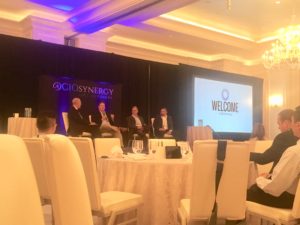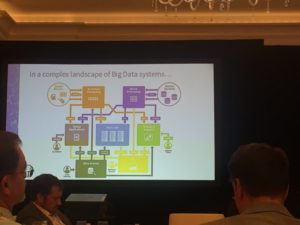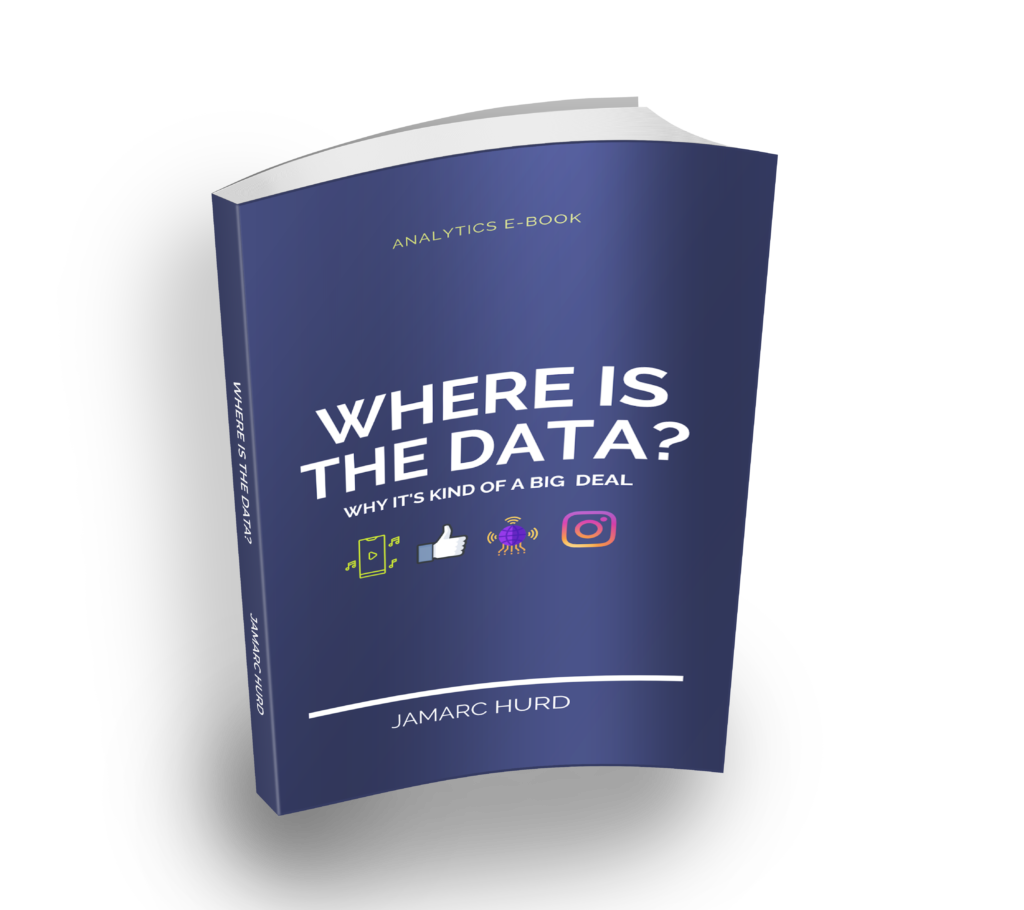
Two Thursday’s ago I attended a CIO event that I said I would do a blog post on but I’ve been super busy with a Hackathon, shooting a pilot and just life and in general trying to figure out what how to organize projects coming across my plate. Not complaining, definitely blessed to be present, but as promised here is my recap.
So the day starts off at 9am as the team over at CIOSynergy gave us a $25 Uber ride to relax on the way there and get prepared to have a bunch of information thrown at us from a variety of speakers from various CIO positions in very different industries across the United States and abroad. So I arrived at the St. Regis where the event is held and jumped out of the Uber. When I arrived I received directions to head to the hotel’s ballroom where the event was being held for check-in and receive my badge for the day.
The first 30 mins of the event involved us grabbing coffee and breakfast, touring the sponsors kiosk and talking with other CIO’S just to get acquainted, basically an icebreaker. I ended up speaking with a guy from a FileStorage company that primarily serviced Mac’s. We had an interesting conversation about his background and what he predicted for technology in the future. When that talk went to long I ventured into the Ballroom where the festivities started. The moderator for the evening was Scott Shuster, a world-renown interviewer of C-Suite execs and ABC correspondents amongst other accolades. He started by announcing the sponsors for the evening, let them speak and introduce their brands and products as well as a few short videos of Domo software that proved to be pretty impressive.
After the introductions Scott introduced the Prediction Panel whose role was to discuss what leaders and strategist should be on the lookout for going into 2018 and beyond in the Mobile, web, cloud, and the application realm. It was pretty cool, it included people from Georgia Tech, AXIS Capital and other companies that I quite remember.
The top takeaways:
- Cybersecurity and how can you protect/block yourself from basic attacks.
- Big Data – How do you quantify and model it to predict events through use cases
- Leveraging Data for Profit and Understanding
Which were all some pretty good takeaways as we as CIO’s work to figure this out daily. I think personally it comes down to asking the right questions and developing use cases as revenue models to determine right directions for data.
Next we transitioned into 2 different speakers from 2 different companies that I’m pretty sure were sponsors for the event. They paid for sponsorship to get a chance to present their products in front of CIO’s which is a pretty good idea. I tell you I did learn what to do with my product, and how to position it and to whom outside of social media.

Next around 11:15 we transitioned to a open bar for the morning. It was kinda crazy because usually you don’t think about drinking around your colleagues early in the morning. Either way it was kinda cool, I hadn’t ate yet so I didn’t have anything but some wine because I didn’t really want to be off mentally conversing with people. At that time everyone had become comfortable with everyone so people where roaming around talking tech to each other and sharing stories about their companies. I ran into a a colleague from work and got into a conversation with a couple of CIO’S from Emory and Georgia Tech which turned out to be very insightful.
While we were talking we transitioned into lunch in which they served salad and Gourmet Chicken and Waffles which was actually pretty good. I thought I had taken pictures to post but I can’t seem to find them in my phone right now lol. The conversations where pretty good and still I can’t quite remember what we were discussing but I know it was an hour or so if tech banter. After lunch, this is really when the conference started to pick up and really got me excited.
We transitioned into the our first speaker of the afternoon of who was pure genius in my opinion on so many levels. Her name was Victoria Livschitz of GridDynamics which specializes in and provides Api’s for In-Stream Processing which basically provides the ability to see what data is doing in real-time. Her presentation broke down everything from the inception of business intelligence, to its present form to where its going and how her company can help. She was from San Francisco, and I really got a chance to talk to her after the conference to pick her brain on the advancements of AI and where she thinks it going. I asked her questions about the overall difference between technology in the West and the South; her answer was that out west (which is a very unique culture) they try to figure out how to advance technology and down south we try to figure how how to consume technology with at its core is a very different dynamic. I also asked her with the advancements of technology doesn’t it seem scary, she said yes “All of it is scary but you might as well make some money off of it”. Duly Noted maamm..

She did leave us with the 6 top drives of success when it comes to retail (see pic below):
- Personalized Search – Augment search hits and relevancy ranking based on personal context and history
- Personalized Offers – Motivate “buy now” behavior by offerings based on deals on personal context and history
- Dynamic Pricing – Determine the “Right Price” for products based on avail, trending, personal context and competitive pricing
- Dynamic Inventory – Predict Inventory needs and re-stock product in stores based on fluctuations in inventory and demand
- Intelligent Sourcing – Determine what to source from what store to optimize delivery SLA’s and shipment cost
- Real – Time Alerts – Detect unusual patterns: fraud, surge in demand, weather change, shift in brand sentiment and respond right away

Afterwards we transitioned into the CIOPanel, which is where selected CIO’s does a tell-all of success, failure and an overall look into how they got to where they are and insights on enterprise IT. This Panel included Thomas Musgrave of Americold Logistics, Robert Scott Marshall of University of North Georgia , and Brent Messer of the Smart City Chattanooga. All of which gave very good breakdowns and breakthroughs of the challenges that are presented in the companies and the city that they reside over with real very different challenges.
Thomas Musgrave– talked about doing business with Amazon and Walmart and how much different they where in terms of expectations. Also how important Vendor Partnerships are becoming more and more crucial to success.
Robert Scott Marshall – talked about how coming into a enterprise and starting change by sticking with the small things, first starting with automating hardware, delivering simplicity to stabilize, and rolling out platforms and scale to handle to problems (Ex: CRM). Sticking to what you are good and partnering skillsets to cultivate talent. Most importantly don’t take on BAD practices.
Brent Messer – talked about how he changed Chattanooga into a cutting edge smart city, one of the first of its kind. He basically made the city a revenue generating city by for example owning the internet lines and selling it to the public. I got a chance to speak with him after and he gave me insight on how to rollout something like that within the public space. Brent also invited me up for a visit in which I will definitely be taking him up on that soon.
After Brent spoke we went off again to the sponsor area where we once again had an open bar as the hotel staff set up for dessert. The talks among the various CIO’s had grown as to be expected because everyone had met and learned something from the various speakers throughout the day so the conversations were more robust.
When were invited back in the ballroom after a short break Rick Smith took the stage. Rick is a entrepreneur, technology leader, TED Speaker, and author of the book The Great Disruption. Rick’s primary message was about how 3-D printing is primed for becoming a big disruption in the world. He provided several examples on how mass production is inefficient and unsustainable. He said that this technology will change the dynamic of business from mass production to mass customization because now everyone wants things tailored to their liking. With a disruption as such,the slow pace of business cannot be sustained. The new role of the leader is no longer to react but to anticipate, and in my opinion the only way to truly do this is to “Ask the right question”. The data is here now aka BIG DATA, now we have to figure out how to use it. Rick left us the challenge of looking for disruption within the markets that we currently serve because they are certainly there. The old way of doing business is no longer the way.

Overall it was a great conference and experience. The only thing that I felt was missing was a conversation about the Social Media aspect of things. Either CIO’s don’t think it matters or maybe its not for them but for the CMO (Chief Marketing Officer) maybe? Not sure, but as IT leaders become more integrated into the day to day business and is also expected not only to implement solutions but also called on to tie these solutions into business results and customer experiences thru data. Social will impact this in one way or another because the customer and experience are all woven into this dynamic.
If you have any questions or comments please post them below and I’ll be happy to discuss. Until next time Happy Technology!
Jamarc…


